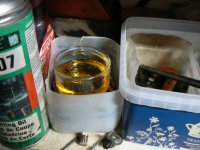Ok, last update until I have something worth reporting concerning my monitoring of the sample of brake fluid.
I thought about it for, oh at least, a few minutes and decided to pour a new sample of fluid from the same container I used earlier in this post. I decided to not simply continue with the sample I'd already tested because I noticed the boiling point tester caused the whole sample to warm up and, by it's very nature, the sample inside the end of the tester is raised to well above 100 dgrees C so must boil off some of the moisture - it is quite a small sample in that wee cup included with the tester.
I found a small glass container - which previously held some of Lidl's very best creme caramel - washed it out very thoroughly and dried it in the airing cupboard over night. Then dispensed at least twice the sample quantity into it than would have been possible with the tester cup. I've placed it on a shelf just inside the garage up and over door so it's in the draught of outside air which blows round the edges of the door but sheltered from the rain. I've left the top open so it can absorb moisture more rapidly than it would in a master cylinder reservoir as my main interest is in comparing the readings from the two testers rather than how long the fluid might take to become dangerously contaminated. Although it will be interesting to see how long this open container takes to get to that stage won't it?
Here it is, in all it's glory!

I'm intending to test it once a week but concerned that testing with the boiling point tester will alter the moisture content by boiling some of it off, which would prolong the test unnecessarily. So We already know that last Sunday 9/10/22 it tested at 243 degrees C and under 1% water with the resistive (Lidl) tester when I tested the sample in the wee container from the Liquid Levers tool kit I think it safe to say we can take this as the first reading. Today I've just tested it again but only with the Lidl tester and again it shows only one light - in addition to the battery ok light - so it's showing under 1% water again.
Because I don't want to reduce the moisture content and thus prolong the test, I'm going to test once weekly with the Lidl resistive tester until it lights up another light and at that point I'll test with the Liquid Levers boiling point tester to see what the corresponding boiling point is. I'm hoping eventually to be able to ascertain what boiling points correlate to the lights on the Lidl tester.
Going to be a long haul I think folks but I think the outcome may be interesting? I'll be back when the next light illuminates, don't hold your breath though!
I thought about it for, oh at least, a few minutes and decided to pour a new sample of fluid from the same container I used earlier in this post. I decided to not simply continue with the sample I'd already tested because I noticed the boiling point tester caused the whole sample to warm up and, by it's very nature, the sample inside the end of the tester is raised to well above 100 dgrees C so must boil off some of the moisture - it is quite a small sample in that wee cup included with the tester.
I found a small glass container - which previously held some of Lidl's very best creme caramel - washed it out very thoroughly and dried it in the airing cupboard over night. Then dispensed at least twice the sample quantity into it than would have been possible with the tester cup. I've placed it on a shelf just inside the garage up and over door so it's in the draught of outside air which blows round the edges of the door but sheltered from the rain. I've left the top open so it can absorb moisture more rapidly than it would in a master cylinder reservoir as my main interest is in comparing the readings from the two testers rather than how long the fluid might take to become dangerously contaminated. Although it will be interesting to see how long this open container takes to get to that stage won't it?
Here it is, in all it's glory!

I'm intending to test it once a week but concerned that testing with the boiling point tester will alter the moisture content by boiling some of it off, which would prolong the test unnecessarily. So We already know that last Sunday 9/10/22 it tested at 243 degrees C and under 1% water with the resistive (Lidl) tester when I tested the sample in the wee container from the Liquid Levers tool kit I think it safe to say we can take this as the first reading. Today I've just tested it again but only with the Lidl tester and again it shows only one light - in addition to the battery ok light - so it's showing under 1% water again.
Because I don't want to reduce the moisture content and thus prolong the test, I'm going to test once weekly with the Lidl resistive tester until it lights up another light and at that point I'll test with the Liquid Levers boiling point tester to see what the corresponding boiling point is. I'm hoping eventually to be able to ascertain what boiling points correlate to the lights on the Lidl tester.
Going to be a long haul I think folks but I think the outcome may be interesting? I'll be back when the next light illuminates, don't hold your breath though!

